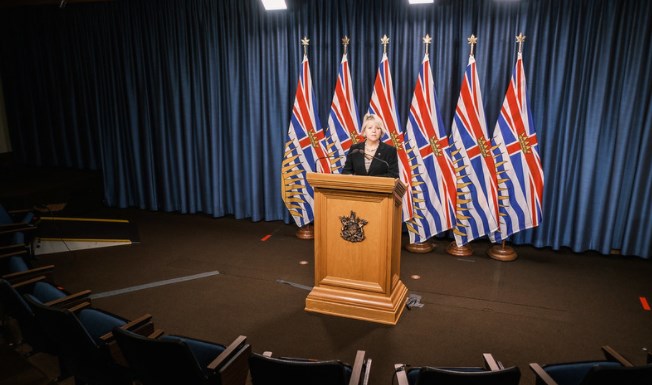B.C. has seen a small resurgence of new COVID-19 cases in the last 24 hours after seeing new infection numbers level off for much of the last week.
Provincial Health Officer Bonnie Henry said Thursday there were 683 new cases in the last day, less than a week after seeing daily numbers fall below 400 during the Christmas weekend.
That total brings the number of active COVID cases in B.C. to 7,803, with eight new COVID deaths in the last 24 hours bringing the total to 901.
“The numbers today remind us that we are still in a very precarious situation,” Henry said.
The numbers indicate a continued concentration of cases in Fraser Health (447 new cases), followed by Vancouver Coastal Health (105), Interior Health (64), Northern Health (36) and Island Health (11). Currently, there are 374 people hospitalized with COVID-19, and 76 who are in intensive-care units (ICU).
In addition, there have been three new outbreaks at long-term care facilities (two of which are in Fraser Health), as well as two outbreaks now declared over. That brings the total number of long-term care outbreaks in the province to 52 (and another nine in acute-care facilities).
As of Thursday, 17,510 people have now been vaccinated – and both Pfizer and Moderna versions of the medicine are now being administered.
The main topic at Thursday’s press briefing, however, continued to be the abruptly implemented New Year’s Eve ban on alcohol sales after 8 p.m.
At the conference Thursday, Henry pushed back on B.C. restaurant owners’ claims that they were not given more than a one-day advance notice on the alcohol sales ban, saying the decision of the ban was made partially because some restaurants expressed concerns about their ability to handle the number of New Year’s celebrants who are expected to consume alcohol this evening.
“We heard about the kinds of holiday celebrations being planned, as well as restaurants expressing concerns about their ability to manage these situations,” Henry said, adding the province did consult with a number of people in the restaurant industry. “What can begin as a quiet dinner can easily get out of control.”
Henry noted a member of her own team cancelling her NYE dinner plans this evening and changing the reservation to Sunday, and encouraged others to book dinners during other nights to continue supporting the embattled restaurant sector.
She also defended the decision to choose 8 p.m. as the cut-off time, as she noted that the sales ban order was meant to target liquor sales at retail locations, not restaurants – although all establishments will have to follow the order to avoid creating a rush of people leaving bars and restaurants at 10 p.m. inebriated and at a higher risk of making decisions to congregate outside of their households.
Henry also placed doubt on whether moving the ban deadline from 8 p.m. to 9 or 10 p.m. would really make a big difference for restaurants if the only change is a couple of additional hours of alcohol sales. Given that what happens on New Year’s Eve will set the tone for B.C.’s COVID curve in 2021, Henry said there is too much to lose to consider an alternative to an 8 o’clock ban.
“Right now, we need to hold the line to make 2021 a brighter time for all of us,” she said. “... This is only about the serving and selling of alcohol. The dinner, the food is all fine up until 10 o’clock. I think we need to focus on what is still there.
“If it’s any consolation, [8 p.m.] will be New Year’s Eve in the Maritimes, and some people will be celebrating in this country at 8 o’clock anyway.”
B.C. Health Minister Adrian Dix concurred, saying that the province is not looking at compensating restaurants for food/beverage purchases made in anticipation of the NYE clientele.
“I think what’s important to recognize this week is that 94 people have passed away from COVID since Christmas Eve, that we have a significant number of new cases, and 374 people are in hospital,” Dix said. “We really need people to dig in right now as we prepare our immunization campaign... because it’s important to do it right now to reduce the number of cases and reduce the people in long-term care... who are in high risk situations.”
On an unrelated note, Dix also confirmed that the province will likely approve the National Hockey League’s plan for the upcoming season after the health officers of five Canadian provinces issued a guideline of what the league should follow in its plans for an all-Canadian division this year. That announcement will likely be coming sometime next week, Dix said.


